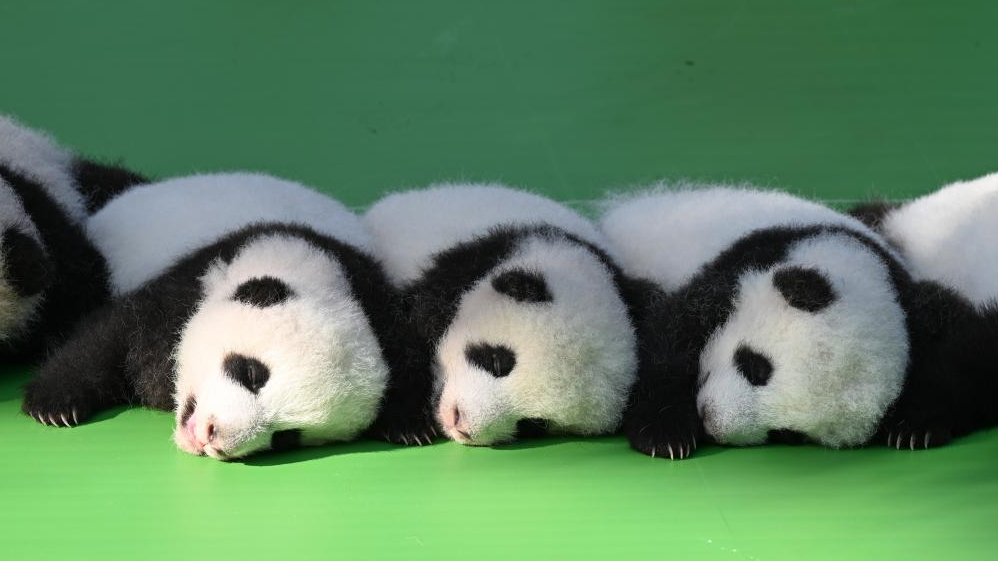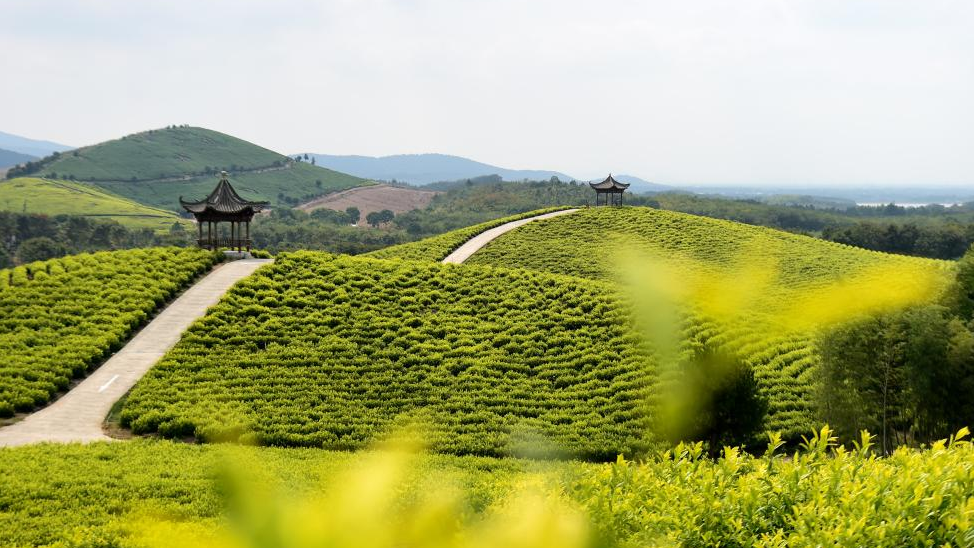Kung Fu family in Xiong'an New Area introduces Chinese martial arts to more than 10 countries
Yingzhao Fanzi Quan, a style of traditional Chinese martial arts with a history of nearly 100 years, has enjoyed increasing popularity among Kung Fu enthusiasts at home and abroad and inspired countless people with the traditional Chinese martial arts spirit and culture, thanks to a family in Xiongxian county, Xiong'an New Area, north China's Hebei Province.
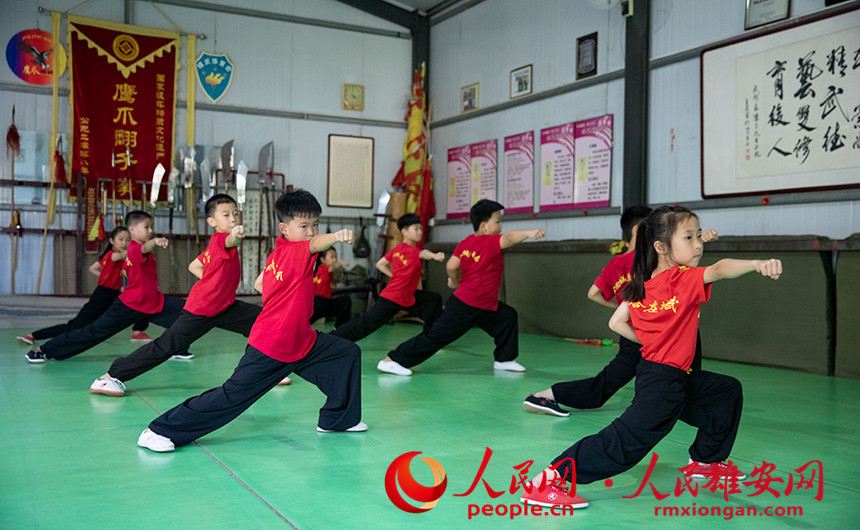
Children practice moves of Yingzhao Fanzi Quan, a style of traditional Chinese martial arts with a history of nearly 100 years. (Photo/Li Zhaomin)
The Chinese Kung Fu style was invented by Chen Zizheng, a Kung Fu master in Lilinzhuang village of Xiongxian county who was known as "Yingzhao Wang", which means "king of the Eagle Claw", a style of traditional Chinese martial arts.
Chen invented Yingzhao Fanzi Quan based on the integration of the essence of two different Kung Fu styles, namely Fanzi Quan and Yueshi Sanshou, between 1919 and 1924. The new style consists of a slew of Kung Fu routines and is known for its hand shape resembling an eagle claw.
After Chen Zizheng passed away, his nephew Chen Guoqing continued to carry forward Ying Zhao Fanzi Quan and taught it to his son Chen Zhengyao. As the third-generation inheritor of the Kung Fu style, Chen Zhengyao mastered his skills to perfection and made spreading the Kung Fu style his lifelong responsibility.
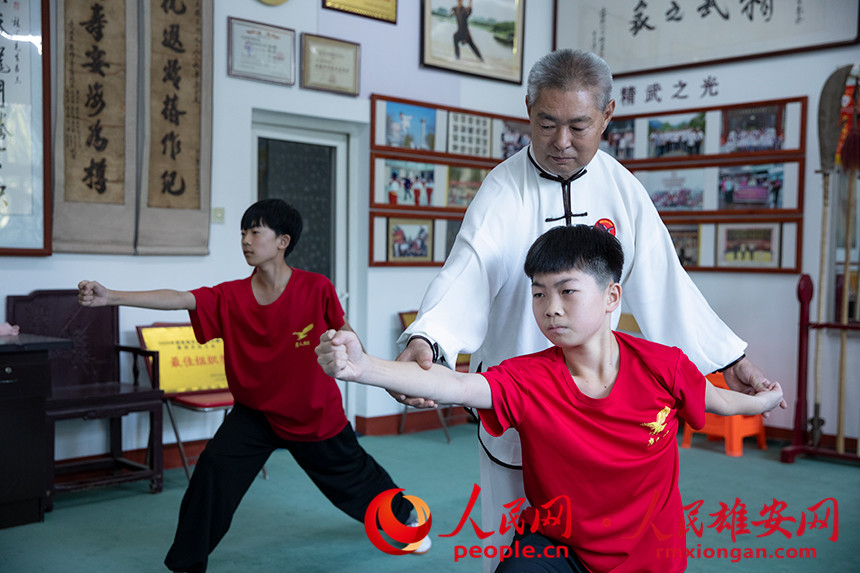
Chen Guixue, an inheritor of Yingzhao Fanzi Quan, a style of traditional Chinese martial arts with a history of nearly 100 years, teaches Kung Fu moves to students. (Photo/Li Zhaomin)
In an effort to better promote Chinese martial arts, Chen Zhengyao opened a martial arts school in Lilinzhuang village in 1986. Over the past decades, he has taught and provided guidance for more than 10,000 Chinese and foreign enthusiasts of traditional Chinese martial arts, taught Yingzhao Fanzi Quan to martial arts learning groups from countries including Japan, the US, Canada, Greece, Singapore, and Malaysia, and been invited to serve as the martial arts advisor of the United States of America Wushu Kungfu Federation.
In 2008, Yingzhao Fanzi Quan was included on the list of China's second batch of national intangible cultural heritage. In the next year, Chen Zhengyao was designated as the representative inheritor of Yingzhao Fanzi Quan by the then Ministry of Culture (now Ministry of Culture and Tourism).
Chen Guixue, son of Chen Zhengyao, has learned Yingzhao Fanzi Quan from his father and grandfather Chen Guoqing since he was 7. Chen Guoqing would wake him up before dawn to make him practice the basics of the Kung Fu style, and always told him to work hard on it and make sure it won't become lost to the world, Chen Guixue recalled.
According to Chen Guixue, Chen Guoqing was very strict with him and would punish him whenever he didn't work hard. "My grandfather would make me squat and maintain a squatting position for as long as he was counting, and more often than not, he counted up to several hundred," Chen Guixue said.
Chen Guixue's painstaking efforts have paid off. After years of practice, he has perfected his martial arts skills and can perform moves in a steady, accurate, powerful, and fast manner, realizing the characteristics of Yingzhao Fanzi Quan to the greatest possible extent.
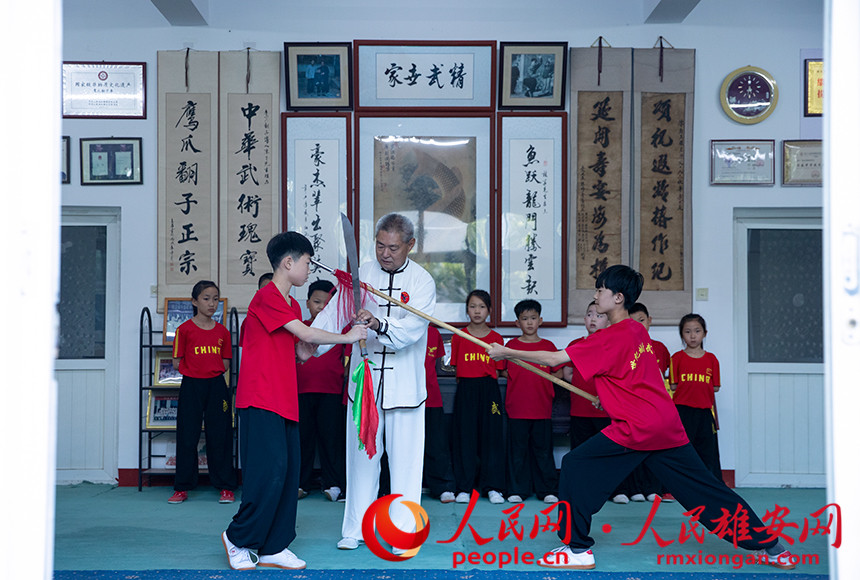
Chen Guixue, an inheritor of Yingzhao Fanzi Quan, a style of traditional Chinese martial arts with a history of nearly 100 years, teaches Kung Fu moves to students. (Photo/Li Zhaomin)
Since the establishment of the Xiong'an New Area in 2017, the local government has made active efforts to promote the inheritance of the traditional martial arts style, and built a two-tiered inheritance model featuring a teacher-student relationship between the older generation of Kung Fu experts and young Kung Fu enthusiasts and between young Kung Fu enthusiasts and children. The efforts have led more young Kung Fu enthusiasts to Chen Guixue.
"To learn this Kung Fu style, one must have good moral character and be willing to work earnestly and extremely hard," said Chen Guixue, who is now the teacher of more than 100 students.
In addition to teaching students, Chen Guixue also tries to promote and popularize Yingzhao Fanzi Quan among the public. He takes his students to temple fairs every year to display the Kung Fu style, in a bid to encourage everyone to do exercises to boost health.
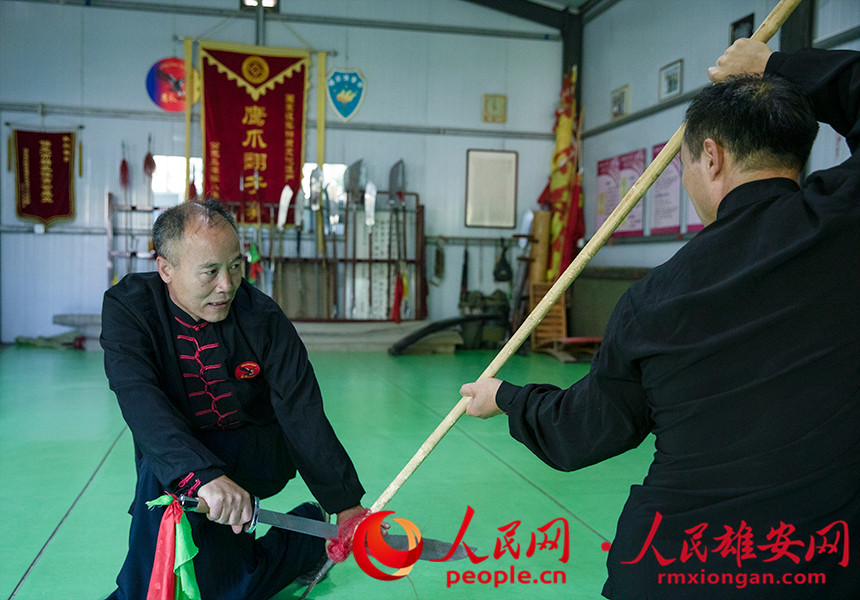
Two men practice moves of Yingzhao Fanzi Quan, a style of traditional Chinese martial arts with a history of nearly 100 years, in pairs. (Photo/Li Zhaomin)
Passing down the Chinese martial arts spirit and carrying forward the traditional Chinese martial arts culture is the mission and pursuit of generations of members of the Chen family, he said.
Today, more than 10,000 people in over 20 provinces in China and more than 10 foreign countries are learning Kung Fu from the Chen family.
Photos
Related Stories
- Woman from SW China’s Sichuan carries forward traditional Chinese culture through martial arts
- Female martial artist devotes decades to passing on intangible cultural heritage
- Inheritor of Wuxing Tongbiquan steadfast in effort to carry on traditional martial art
- Chinese Martial Arts competition held in Cotonou, Benin
- Feature: Chinese martial arts flourish in Ethiopia
- People practice Chinese martial arts Kungfu in Rafah
- Shaolin monks practice martial arts at Pagoda Forest of Shaolin Temple in Henan
- Nigerien student becomes "top martial artist" in China
- Young Botswanan shares benefit of Chinese martial arts culture
- Palestinian girls practice Chinese martial arts in West Bank
Copyright © 2022 People's Daily Online. All Rights Reserved.








